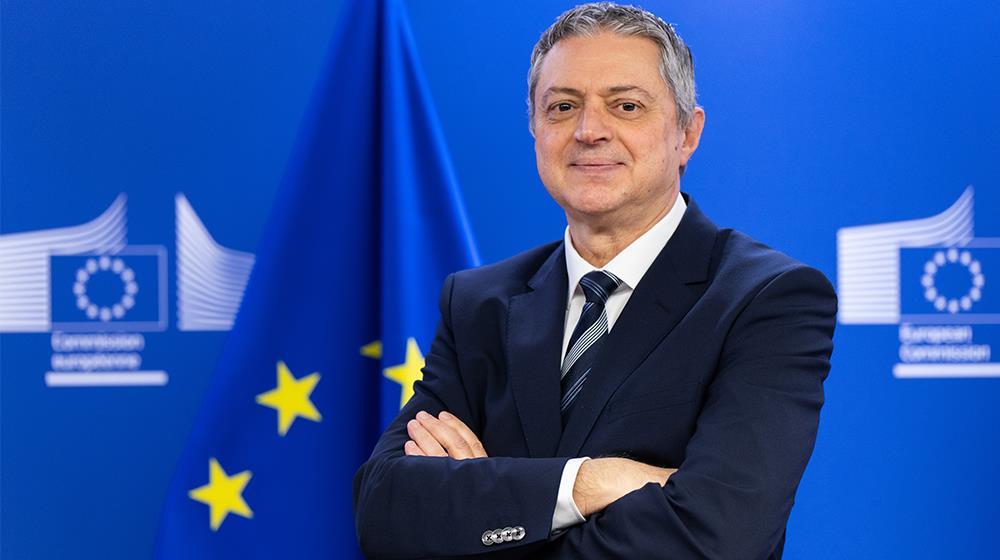The EU’s readiness for issues related to artificial intelligence must be constantly renewed with new information, new skills and continuous improvement of models, Christos Ellinides, Director-General of the European Commission’s Directorate-General for Translation (DGT) suggests.
The Cypriot official was in Nicosia recently for a conference entitled 'Empowering Europe with AI: The European Commission AI-based Multilingual Services' which was organised in collaboration with the Press and Information Office.
He spoke to the Cyprus News Agency.(CNA) about the work at DGT, how ready the EU is in the AI era and the risks and challenges AI presents to the press.
Ellinides noted that the EU has now a robust regulatory framework (AI Act) and a clear strategic orientation for AI, and this includes the use of AI in public services, investments/infrastructure (EuroHPC- European High Performance Computing Joint Undertaking ), AI toolkits for administrations and strong skills programs (academies/specialised training in AI, cybersecurity, data, 5G/6G, etc.).
At the same time, he explained, the institutional LLM (Large Language Model) education with European data is progressing, which constitutes a practical step towards technological dominance and linguistic parity.
"We are, however, in a 'continuous struggle'. Readiness must be constantly renewed with new information, new skills and continuous improvement of models. In order to enhance our ability for this ''struggle' we are currently acquiring four supercomputers now in the global top-10 (up from two six years ago) and we are working to create four-five gigafactories," Ellinides told the Cyprus News Agency.
He also mentioned that, in the near future, the Commission will also present a Data Union Strategy for seamless access to quality, structured data.
Media and AI
Replying to a question whether the media should "fear" AI and whether journalism is at risk and to what extent, the Commission official said that AI is not a competitor, but a power multiplier for the media.
He described it as a toolbox for faster preparation, transcription, translation, summaries and initial drafts, allowing journalists to devote more time and brainpower to research, verification and storytelling.
"However, journalistic diligence is required. I would like to explicitly underline that the results of AI always need to be checked, supervised and verified, and the use must be done in safe, protected environments, just like the services of DG Translation offer," he said.
Ellinides emphasised that AI is an ally of quality information, not a threat to it, while the human factor is not eliminated.
He also explained that the EU's Apply AI Strategy, announced just recently (8 October), explicitly encourages policies that prioritise AI (AI-first) with safe implementation above all else so that organisations, in this case, the media, can responsibly integrate AI, reaping benefits in terms of speed, accuracy and public access to information.
The work of the DGT
The Directorate-General for Translation, headed by Ellinides, is the European Commission's leading body for linguistic equality and multilingualism.
It has a personnel of approximately 2,000 persons, of whom 70% are language professionals and 30% work in the fields of administration, IT and artificial intelligence.
The staff is mainly distributed in Brussels and Luxembourg. The DG also employs one or two of its representatives in the EU Delegations in the EU member states.
"We provide not only translation, but also a set of multilingual AI-based services (eTranslation, eSummary, eBriefing, eReply, WebText, Accessible Text, speech transcription), with a particular emphasis on security, data protection and access from the entire EU ecosystem," Ellinides told the Cyprus News Agency.
He explained that the services operate within the EU, without access, storage, reuse and sharing of data, with encryption and the EU Login system. These services, he said, are already being used on a large scale.
"Our strategic goal is that no citizen feels excluded and that we make information available to them in a language they understand faster, more securely and with high quality," he said.
How AI helps the work of the Translation Directorate
As Ellinides explains, AI significantly improves productivity and accessibility to information, but is also accompanied by risks and biases, e.g. in terms of transparency of data use, insufficient language coverage, control, security and quality.
"We face these challenges with strict data governance. As I already said, we process it exclusively within the EU, we do not store it, we do not reuse. We are fully compliant with the AI regulatory framework," he noted.
Practical governance tools accompanying the strategies are the new AI Act Service Desk for smooth implementation of the AI Act, the Apply AI Alliance for coordination between agencies and the AI Observatory for systematic monitoring of trends and impacts.
"Our goal is to better cover all languages with safety and quality. As Commission President von der Leyen noted, we want the future of AI to be shaped in Europe. Because when AI is used, we can find smarter, faster and more accessible solutions. And the adoption of AI should set priority for security as well," Ellinides said.
The conference in Nicosia
At the conference in Nicosia, co-organised by the Press and Information Office, Ellinides presented the EU policy framework for AI, including the AI Regulation and the 2024–2029 guidelines.
He also presented the three-pillar mission of his Directorate, namely the development of secure, multilingual AI services funded, among others, by the Digital Europe programme, the training and promotion of European Large Language Models (LLM) with institutional multilingual data for better coverage – especially in less represented languages, and the creation of a European Language Area Data.
Tools that are under development were also presented, as well as the integration points, among others, in administrative systems, education, small and medium-sized enterprises, and the media, free of charge and always with a focus on quality, security, and practical utility for public administrations and citizens.
(Source: CNA)









